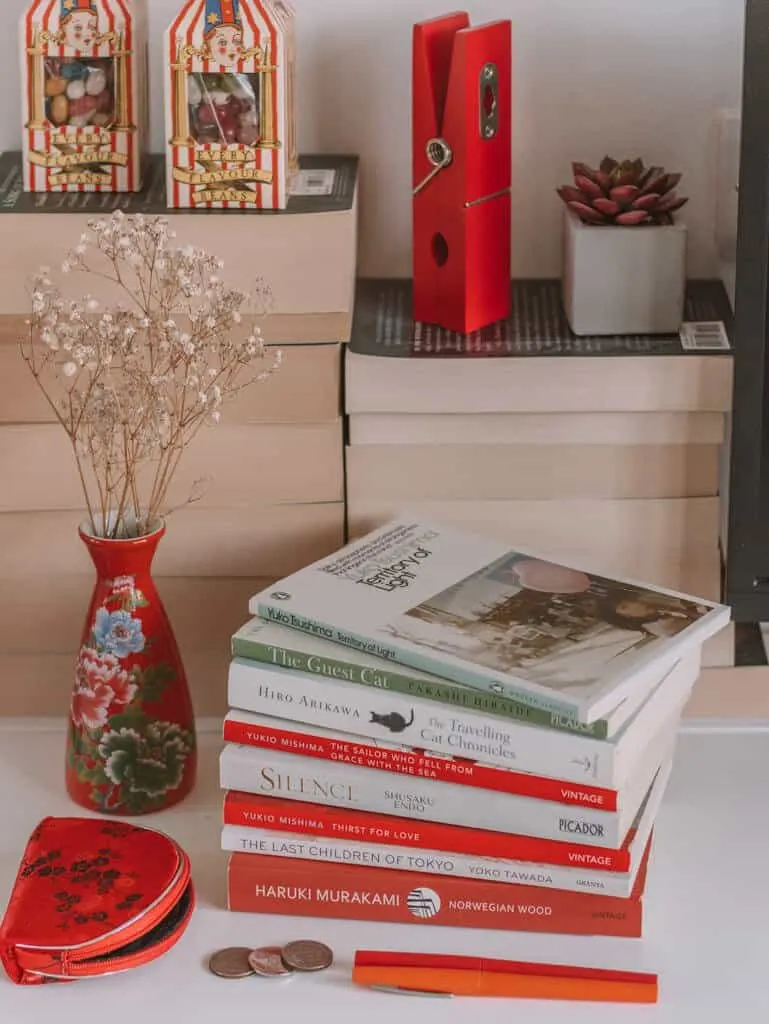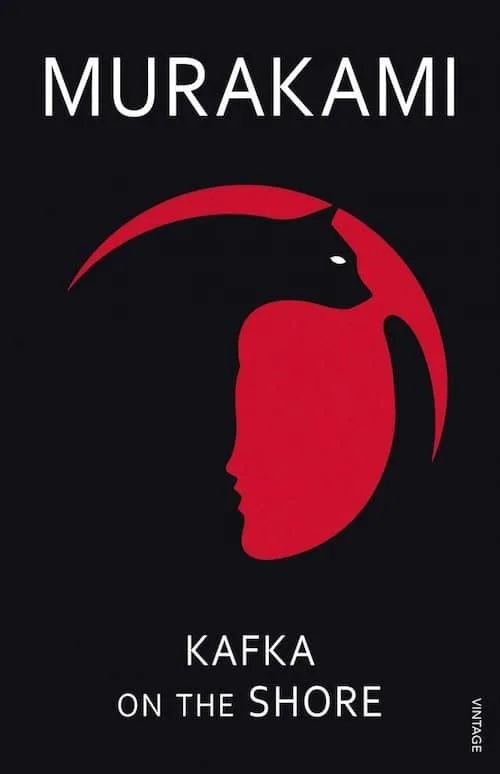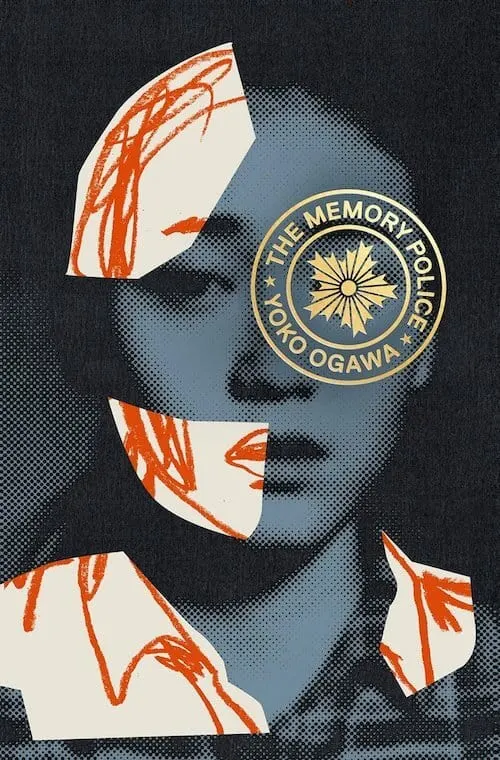
Japanese literature has rapidly gained popularity in the West and for good reason too. Japanese authors seem to write with an elegant, often ethereal quality, no matter what the subject matter is.
Now let me tell you how I first discovered Japanese books back in 2017.
My love for literary travel was properly born on a trip to Japan. This was the first trip for which I bought several books set in the country I was travelling before setting off.
On my list of novels in Japanese were Norwegian Wood, The Guest Cat, The Sailor Who Fell From the Sea and Thirst For Love.
So began my love affair with Japanese literature.
On my list was a mix of Japanese novelists from the twentieth and twenty-first centuries but there was something in the style of writing that was so very different from any Western literature I’d read.
Whilst some of those books were to be amongst the best books on Japan, others were quite new releases. All were excellent.
Today I’ve invited the lovely Abbie from @ab_reads on Instagram to join me in sharing her favourite books on Japan. She recently became a freelance writer and I saw her reading lots of Japanese literature books so I knew I wanted to work with her.
First, you’ll find her recommendations for Japanese novels to read, then I list my own.
Now let’s delve into some really good Japanese books in English!
Amazing book deals you don’t want to miss
Blackwells: Free worldwide delivery on every order
Audible: Get 1 audiobook free plus all Audible originals
Kindle: Save up to 80% on Kindle book deals
Prime Reading: Unlimited access to a rotating catalogue of e-books
Japanese Novels
Abbie’s recommendations for the best Japanese books:

Kafka on the Shore by Haruki Murakami
Translated by Philip Gabriel
Kafka on the Shore is one of Murakami’s weirder novels – and that’s surely saying something. Talking cats, rainstorms of fish, and a Hegel-quoting prostitute all feature in this book, and that’s probably not even the weirdest part.
Our protagonist Kafka Tamura runs away from home to escape fulfilling a gruesome Oedipal prophecy – yep, Oedipus is the one who slays his father and then sleeps with his mother.
Kafka is determined to avoid this fate, so he leaves home for a fresh start, meeting Nakata along the way, an endearing old man who never recovered from a wartime affliction.
Anyone already familiar with Murakami’s work will know what to expect (i.e. the book version of severe acid trip), but newbies, be warned.
His work is so surreal, blurring lines between past and present, dreams and reality, that sometimes you have to accept that you won’t catch everything he’s putting out there and just enjoy the ride.
The author himself recommends reading this mind-bending novel more than once to appreciate it fully, so don’t feel discouraged if at first you feel completely at sea.
Buy Kafka on the Shore: Amazon | Waterstones | Blackwells

A Tale for the Time Being by Ruth Ozeki
Although not translated from Japanese, Ruth Ozeki is part of the Japanese diaspora and this novel weaves together two storylines: one set in Japan and the other in Canada.
Ruth, one of the main characters, is an author living on a remote island who stumbles across a washed-up Hello Kitty lunchbox on the beach one day. Inside she finds Nao’s story, handwritten in a journal, as well as that of her one-hundred-and-something-year-old grandmother, a Buddhist nun.
Among the themes that Ozeki tackles are bullying, prostitution, Alzheimer’s, environmentalism, ethics, philosophy and even quantum physics. Through Nao, Ozeki explores a darker side of Japanese society.
Nao is mercilessly bullied by her classmates for being an outsider (having lived in America for some years), her father becomes a hikikomori, or a hermit, eventually attempting to take his own life, while Nao herself turns to working at compensated dating cafés to escape school.
It’s rare to find a book where both narrators in a dual storyline are equally compelling, but Ozeki pulls it off perfectly. Your mind is guaranteed to be blown as the two storylines begin to collide, culminating in one of the most thought-provoking endings I’ve ever read.
Buy A Tale for the Time Being: Amazon | Waterstones | Blackwells

The Memory Police by Yōko Ogawa
Translated by Stephen Snyder
From the first line of this book, you’re made aware that something is not quite right. The narrator, an unnamed woman, muses on ‘what was disappeared first’. Immediately we’re left wondering what she could mean by something ‘being’ disappeared, and it’s not long before the sinister truth of the island is revealed.
Innocuous objects such as musical instruments and hats are disappeared strategically and completely by the formidable Memory Police. Once disappeared, anyone found in possession of memories of these now-forbidden objects will be punished.
Quiet yet haunting, Ogawa doesn’t need to rely on over-the-top violence to create an impact. Stephen Snyder does a phenomenal job of translating the quiet power of her words, capturing the claustrophobia and frustration of the situation perfectly.
None of the characters have proper names, which serves to create a certain distance between them and the reader, but it could be argued that this only heightens the power of the novel. We don’t know their names, but we come to care deeply about their fates nevertheless – truly an impressive feat of characterisation.
Buy The Memory Police: Amazon | Waterstones | Blackwells

In the Miso Soup by Ryū Murakami
Translated by Ralph McCarthy
When you’re thinking about the best Japanese literature, your mind might instantly jump to Haruki Murakami, but Ryū is another popular Murakami – although one whose work should come with a warning label!
This Murakami is only for readers with a strong stomach and no aversion to graphic violence, but if you like your fiction on the darker side then Ryū should definitely be on your radar.
Ryū is known for exploring the human nature through the seedier side of Japanese culture, and In the Miso Soup is a perfect example.
Set against the backdrop of Tokyo’s red light district, Kanji is a nightlife tour guide who has a disturbing feeling that his newest client may have dark desires… murderous desires, in fact. What follows is a blood-soaked frenzy that would give American Psycho a run for its money.
He builds tension perfectly throughout the novel, making the reader aware from the first few pages that there’s something about Frank not to be trusted. A creeping sense of unease itches beneath your skin before exploding into total chaos.
Amid the slasher-like violence, however, there are also some unexpectedly philosophical musings on fear and loneliness, as Ryū ponders what could drive a human being to commit such heinous acts.
Squeamish readers, stay away, but for a creepy, almost existentialist examination of the darkness of the human condition, give this Murakami a try.
Buy In the Miso Soup: Amazon | Waterstones | Blackwells

Spark by Naoki Matayoshi
Translated by Alison Watts
A bestseller in Japan and winner of the prestigious Akutagawa Prize, Spark is a new title from Pushkin Press by the celebrated comedian Naoki Matayoshi. Spark has already been adapted into a popular Netflix series (Hibana: Spark) and offers an insight into the Japanese comedy scene, particularly ‘manzai’ comedy.
Manzai is a comedy act performed by a double act, a traditional form of Japanese comedy which relies heavily on misunderstandings, puns and verbal gags.
This makes it a little difficult to translate into English while maintaining the humour, but Alison Watts does an admirable job here, allowing the reader to get a feeling for the type of comedy popular in Japan.
The story itself centres around an aspiring manzai comedian, Tokunaga, who moves to Tokyo to achieve his dreams of stardom. There, he meets Kamiya, an experienced comedian who agrees to be Tokunaga’s sensei if he will write his biography.
With this book, Matayoshi pushes the reader to question how far it’s acceptable to go in the name of a joke – resulting in a very surprising ending. He also accurately documents the struggles of those aspiring to a creative profession, where rejection and poverty are common on the way up the ranks.
A quirky read for anyone interested in learning about a lesser-known aspect of Japanese culture.
Buy Spark: Amazon | Waterstones | Blackwells

Convenience Store Woman by Sayaka Murata
Translated by Ginny Tapley Takemori
Keiko Furukura thrives in her job as a convenience store worker. Having been deemed a ‘strange child’ her entire life, her parents are thrilled when she lands her first job in a convenience store at 18.
Fast forward another 18 years and Keiko is still working at the store, finding solace in the predictability of her world, mimicking her co-workers’ mannerisms to pass as a ‘normal’ person.
While Keiko is content with her lot, she can’t help but feel that she’s failing to live up to her parents’ – and society’s – expectations of her.
RELATED: Convenience Store Woman Book Review
When a strange young man starts working at her store, she decides a boyfriend is what she needs to maintain her façade of normality.
Anyone who’s ever worked in retail and experienced some level of social ineptitude will find themselves relating to Keiko in some way.
I love the way Murata explores what it means to be ‘normal’, delving into Japan’s high expectations for its citizens to be perceived as functioning members of society, no matter how they might feel inside.
Keiko steadfastly refuses to conform to these norms, happy as she is with her unconventional way of life.
This one is a must-read for fans of quirky protagonists, including Eleanor Oliphant is Completely Fine and An Elderly Lady Is Up to No Good.
Buy Convenience Store Woman: Amazon | Waterstones | Blackwells

Kitchen by Banana Yoshimoto
Translated by Megan Backus
No list of the best Japanese literature would be complete without Banana Yoshimoto. Sweet yet sad, Kitchen is the literary equivalent of snuggling up with a warm bowl of soup or a giant mug of tea after a terrible day.
A meditation on grief and loss, Kitchen comprises two stories, one novella length and one more of a short story, both featuring two young women who have known more loss than any young person should.
In the first story, Kitchen, Mikage finds solace in the homeliness of kitchens – whether they’re sleek and modern or quaint and rustic, she never feels more at peace than in this room of the house.
But peace is something hard to come by after the loss of her entire family, and then the subsequent loss of her adoptive mother of sorts.
Surprisingly, although much shorter, Moonlight Shadow is my favourite of the two stories. A mysterious stranger appears by the river one night as Satsuki mourns for her boyfriend, lost in a car accident. With the help of this stranger, Satsuki can come to terms with her grief in an unusual but beautiful way.
Megan Backus captures Yoshimoto’s simple yet effective prose in translation. The writing is sparse yet full of emotion, which means the sorrow of these stories creeps up on you, taking you unawares until you realise you’re mourning right alongside the characters.
The most gentle and hopeful musing on grief and loss that you could wish for.
Buy Kitchen: Amazon | Waterstones | Blackwells
Thanks, Abbie!

Now here are my own recommendations for the greatest Japanese novels:

Norwegian Wood by Haruki Murakami
Translated by Jay Rubin
That’s right, Haruki Murakami is so good he deserved to be on this list twice. He’s usually the first Japanese writer that springs to mind and widely regarded to be one of the best Japanese authors. Norwegian Wood is Murakami’s most famous novel and one of the most famous Japanese novels in English.
This book follows the story of Toru Watanabe, a student in Tokyo in the 1960s. He’s quiet and serious but somehow ends up entangled between two beautiful, but very different, women.
The first is Naoko, the ex-girlfriend of his best friend who took his own life when they were both teenagers. This event scars both Toru and Naoko, but Naoko is never the same again. Troubled though she is, Toru can’t help but love her and he remains obsessed with her for the majority of the novel.
Then there’s Midori. Midori comes into Toru’s life whilst he’s at university and adds a little spark to it. She’s fun and feisty with a horribly dirty mind, which Toru finds quite refreshing.
Whilst Norwegian Wood is, on the surface, a simple love story, it has achieved critical acclaim worldwide. Something which actually shocked and dismayed its author who never intended it to be so.
However, this story isn’t about what happens, and, indeed, very little happens. It’s a coming-of-age story centred on emotions that lie beneath the surface and there’s a certain disillusionment with the system too.
Some passages are almost lyrical, whilst others will disgust you. And to be honest, I still don’t know how I feel about it. In any case, it seems to be required reading for fans of Japanese literature so you’ll have to read it for yourself to find out what all the hype is about.
A film adaptation of Norwegian Wood was released in Japan in 2010.
Buy Norweigan Wood: Amazon | Waterstones | Blackwells

The Sailor Who Fell From Grace with the Sea by Yukio Mishima
Translated by John Nathan
The Sailor Who Fell From Grace with the Sea is the book that made me fall in love with Japanese literature. Mishima’s writing is simultaneously dark and beautiful and he’s the only Japanese author on this list who I’ve read several books by. Needless to say, I think he’s one of the best Japanese writers.
This book’s plot is reminiscent of Lord of the Flies. It tells the story of a group of young, teenage boys who believe human life and society are futile.
A dashing sailor begins dating the group leader’s mother and at first, all the boys idolise him thinking he is the very symbol of masculinity.
However, their obsession takes a dark turn when they realise he is actually not the man they had built up in their minds at all.
With themes such as glory, dehumanisation, gender, and alienation, this is a fascinating look at the sentiments growing in post-WWII Japan. It takes what is often considered to be childish innocence or “boys being boys” and takes us down a dark and vicious route.
What makes this book even more fascinating is the connection between the plot and the author’s own life. If you know the ending of this book, look up just how Mishima met his tragic end.
Two other books by Mishima that I’ve read and would recommend include: Thirst for Love and The Sound of Waves.
Buy The Sailor Who Fell From Grace with the Sea: Amazon | Waterstones | Blackwells

The Travelling Cat Chronicles by Hiro Arikawa
Translated by Philip Gabriel
No list of Japanese literature would be complete without mention of a few Japanese books centring on cats. Japanese people seem to be obsessed with them!
The Travelling Cat Chronicles is one of the OG Japanese cat novels, giving us an insight into the mind of Nana the cat. Doesn’t every cat owner wonder what is going on in their pet’s head?
Nana is off on a road trip with his owner, Satoru. They pay a visit to many of Satoru’s old friends around Japan and each seems especially interested in Nana. Nana can’t figure out why they’ve taken this journey but he refuses to leave his master’s side.
It’s not until much later on that it dawns on both Nana and the reader what the purpose behind this trip is, but it may just break your heart.
READ MORE: The Travelling Cat Chronicles Review
It’s impossible not to love this snarky, self-interested street cat. There’s something profoundly human about Nana’s narrative which is at once disconcerting and familiar.
Seeing the world through this cat’s eyes gives you a fresh perspective on human norms and makes you wonder if they are normal at all.
Reading about all the ridiculous things humans do around cats definitely adds an element of humour to this novel.
However, whilst this novel starts out with quite a light-hearted tone, there’s an undercurrent building and you’ve got no idea what it is until it slaps you right in the face. Make sure you’ve got a box of tissues close by for that shock reveal because I guarantee you’ll be sobbing by the end of this book.
The Travelling Cat Chronicles is a slow burner but definitely one I’ll be reading again and again. What’s more, as the pair visit lots of different regions in Japan as they move from friend to friend, this is usually my top recommendation for books set in Japan.
Buy The Travelling Cat Chronicles: Amazon | Waterstones | Blackwells

The Last Children of Tokyo by Yoko Tawada
Translated by Margaret Mitsuntani
The Last Children of Tokyo is a deeply unsettling short story about an old man and his great-grandson. The reader is not told what year the story is set in but one can assume it is a distant (or perhaps not so distant!) future. A terrible man-made disaster has caused each and every country to close its borders and Japan is left to fend for itself.
In this fictional society, the elderly are strong and take on the role of caretakers whilst the newest generation of children are weak and sickly. Yoshiro is over 100 years old but all he thinks about is the health of his grandson, Mumei.
What’s more, Yoshiro is part of an underground Emissary Association who attempt to smuggle selected young children on ships sailing to foreign countries so international scientists can carry out research on the health of Japanese children.
As with a lot of the best Japanese fiction books, The Last Children of Tokyo is strange. The world Tawada has constructed is terrible to think about and she blurs the line between old and young, female and male, past and future.
It may be science-fiction but it is an especially interesting read given the struggles we are facing in 2020. It’s strange that when I read this in February 2020 the idea of countries shutting their borders seemed like an impossibility but at the end of March 2020, it is reality!
Despite the content, the writing is whimsical and somewhat ethereal in places. Any gaps left in the story are made up for with mesmerising prose.
The Last Children of Tokyo won the National Book Award 2018 for Translated Literature in 2018 under its US name, The Emissary.
Buy The Last Children of Tokyo: Amazon | Waterstones | Blackwells

The Guest Cat by Takashi Hiraide
Translated by Eric Selland
Another cat novel! The summary will tell you that this is the story of a cat who invites itself into the home of a childless couple who rarely speak to each other. And at its most basic level, that is the plot of The Guest Cat.
However, it’s one of those books in which nothing really happens and it’s actually much more to do with the fact that not all of life’s problems are solvable.
It’s less about the entrance of the cat into this couple’s lives but the minutiae of their everyday existence. We never find out their names which further supports the idea that this is much more about the human condition than the cat.
The writing is lyrical and at places feels more like poetry than prose. It won’t surprise readers of The Guest Cat to know that Takashi Hiraide is actually best known for his poetry. This short story is both heartwarming and captivating but don’t be surprised if the last page of this book leaves you feeling a little confused.
Buy The Guest Cat: Amazon | Waterstones | Blackwells

Territory of Light by Yuko Tsushima
Translated by Geraldine Harcourt
I’ve had a fascination with books about motherhood ever since I did my dissertation on the works of Duras so I was eager to dive into Territory of Light.
It tells the story of a young mother who is living alone in Tokyo. Her husband has left her and she must find a way to continue her life as best she can whilst not letting her personal life disrupt her job or her child’s care. Events take place over the course of a year and we see the highs and (mostly) lows of this period of adjustment.
Similar to many of the books above, the plot of Territory of Light is not what will stay with you, it’s the sentiments and the somewhat ethereal descriptions.
As the title suggests, the story is punctuated with descriptions of light: how it touches the floor, the roof, streetlamps, fireworks in the sky and more. Though much of life is mundane, there is a beauty in the every day that this book captures wonderfully.
Buy Territory of Light: Amazon | Waterstones | Blackwells
So there you have some of the best Japanese novels of all time! This list will continue to be updated over the next few weeks as I’ve got a few more popular Japanese books to read on my shelves!
Further top Japanese books translated to English that you should pick up include Before the Coffee Gets Cold, Strange Weather in Tokyo and more. Happy reading!

Abbie Walker
Guest AuthorAbbie is a freelance writer, translator and content creator from the North East of England. She reads a lot of books and posts about them under the handle @ab_reads on Instagram, winning Bookstagrammer of the Year Award from the London Book Fair 2019.
If you loved this post, pin it for later!

More posts like this:
15 Books Like Crazy Rich Asians
15 Diverse Books to Get Stuck Into
15 French Classics to Add to your Shelves
28 Books Set in Paris
10 Classic Italian Books to Read
9 Books about Korea to Read
15 Best Gothic Novels

Laura
Editor of What’s Hot?
